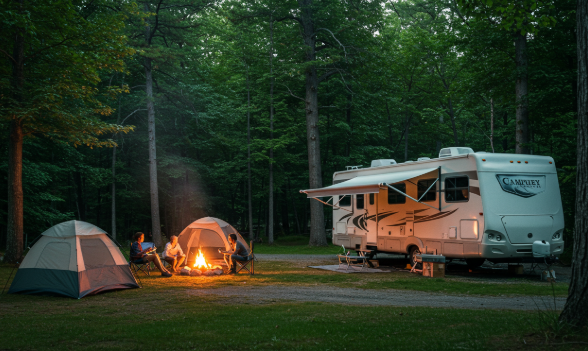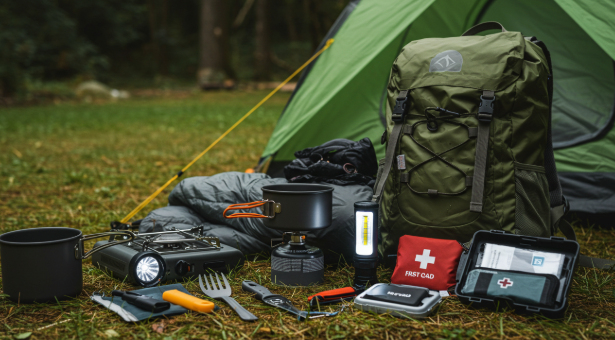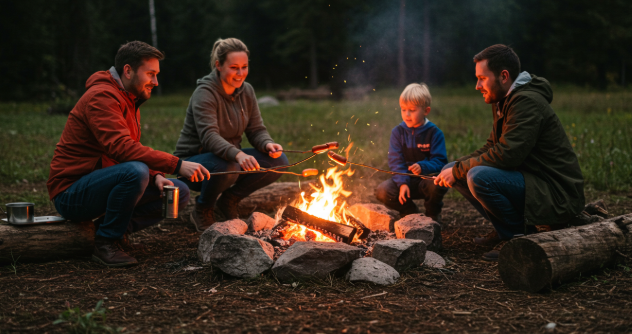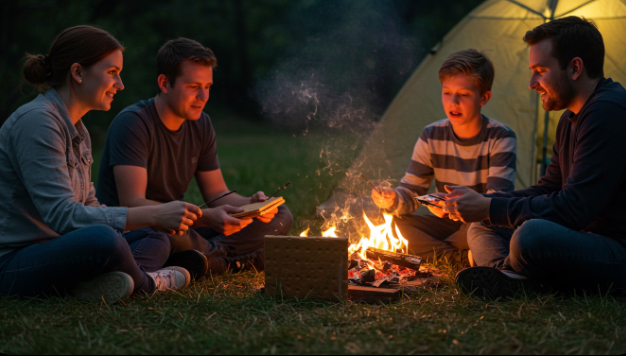Camping 101
Camping 101: A Beginner’s Guide to the Great Outdoors
Welcome to the great outdoors! Camping is a fantastic way to connect with nature, relax, and create lasting memories. Whether you’re a first-timer or need a refresher, this guide will help you prepare for your adventure.

1. Choose Your Camping Style
1. Tent Camping
- Pros:
- Affordable and accessible.
- Offers a close-to-nature experience.
- Lightweight and easy to transport.
- Flexible with campsite locations.
- Cons:
- Limited comfort and amenities.
- Weather-dependent and less insulation.
- Requires setup and takedown effort.
2. RV Camping
- Pros:
- Comfortable with home-like amenities (bed, bathroom, kitchen).
- Provides shelter from weather and pests.
- Ideal for families or longer trips.
- Easier for those with mobility issues.
- Cons:
- Expensive upfront and ongoing maintenance costs.
- Limited to RV-friendly locations.
- Less immersive nature experience.
- Requires fuel and parking considerations.
3. Backpacking
- Pros:
- Ultimate freedom and access to remote areas.
- Minimalistic and lightweight gear.
- Promotes fitness and self-reliance.
- Deep connection with nature.
- Cons:
- Physically demanding and requires planning.
- Limited comfort and amenities.
- Dependent on weather and terrain.
- Safety concerns in isolated areas.
Which to Choose?
- Tent Camping: Best for a balance of cost, nature, and comfort. Great for beginners or families.
- RV Camping: Ideal for those who prioritize comfort and convenience, especially for longer stays.
- Backpacking: Perfect for adventurers seeking solitude, challenge, and exploration of remote locations.
Your choice depends on your priorities, physical ability, budget, and the type of experience you want!
2. Pick the Perfect Campsite
- Research campgrounds in your area or near your destination.
- Check for amenities like restrooms, water access, and fire pits.
- Reserve your spot early, especially during peak seasons.

3. Essential Gear Checklist
- Tent (with stakes and a rainfly)
- Sleeping bag and sleeping pad
- Camping stove or portable grill
- Cooking utensils and food storage containers
- Flashlights or headlamps (plus extra batteries)
- First-aid kit
- Weather-appropriate clothing and sturdy footwear
- Water bottles or hydration systems
- Backpack for day trips or hikes

4. Plan Your Meals
- Pre-plan simple, easy-to-cook meals like sandwiches, pasta, or foil packet dinners.
- Bring snacks like trail mix, granola bars, or fruit.
- Don’t forget essentials like a cooler, ice packs, and trash bags.
Camping meals should be easy to prepare and require minimal cleanup. Opt for recipes with fewer ingredients and consider pre-cooking or prepping at home.
Meal Ideas
Breakfast:
- Instant oatmeal with dried fruits and nuts.
- Pancakes or waffles (pre-mix the batter at home).
- Breakfast burritos (wrap scrambled eggs, cheese, and veggies in a tortilla).
- Granola bars and fresh fruit for a quick, no-cook option.
Lunch:
- Sandwiches or wraps (pre-slice toppings like cheese, meats, and vegetables).
- Pasta salad or grain bowls (make ahead and store in reusable containers).
- Peanut butter and jelly sandwiches for a low-maintenance option.
Dinner:
- Foil packet meals (chicken, veggies, and seasoning wrapped in foil and cooked over the fire).
- Hot dogs or sausages roasted on sticks.
- One-pot meals like chili, stew, or pasta.
- Grilled burgers or kebabs with pre-chopped veggies.
Snacks:
- Trail mix, jerky, or dried fruits.
- Crackers and cheese.
- S’mores for dessert by the campfire.
4. Prep at Home
- Chop vegetables, marinate meats, and pre-cook items like rice or pasta.
- Store food in airtight containers or zip-top bags to keep everything fresh and organized.
- Label containers for easy identification.
5. Don’t Forget the Essentials
- Cooking utensils: spatula, tongs, and a can opener.
- Seasonings, oils, and condiments in small, travel-friendly containers.
- Biodegradable soap, sponges, and trash bags for cleanup.
- A cooler with ice packs to keep perishable foods fresh.
6. Stay Safe
- Familiarize yourself with local wildlife and potential hazards.
- Keep your food stored securely to avoid attracting animals.
- Check the weather forecast and prepare for sudden changes.
- Share your camping plans with someone you trust.
7. Enjoy the Experience
- Take time to relax, explore, and unplug from technology.
- Try activities like hiking, fishing, or stargazing.
- Capture the memories with photos, but remember to live in the moment.
Some fun to do Ideas While Camping

- Themed Campfire Nights: Pick a fun theme like “Wild West,” “Space Adventure,” or “Tropical Getaway” and decorate your campsite accordingly. Include themed activities, food, and music.
- DIY Outdoor Movie Night: Bring a portable projector and a white sheet to set up an outdoor movie experience. Don’t forget the popcorn!
- Campfire Cooking Challenge: Split into teams and compete to create the best campfire dish using limited ingredients.
- Star Gazing Party: Bring a telescope or a stargazing app, and identify constellations, planets, or meteor showers.
- Scavenger Hunt: Create a nature-themed scavenger hunt for the campsite or nearby trails. Include items like pinecones, specific leaves, or animal tracks.
- Glow-in-the-Dark Fun: Bring glow sticks, LED lights, or glow-in-the-dark paint for nighttime games like tag or ring toss.
- Outdoor Crafts: Use natural materials like leaves, sticks, and rocks to create crafts such as dreamcatchers, rock art, or leaf rubbings.
- Campfire Storytelling: Share ghost stories, personal adventures, or make up a collaborative story where everyone adds a part.
- Survival Skills Workshop: Practice knot tying, fire starting, or building a shelter to learn some valuable survival skills.
- Nature Photography Challenge: Bring cameras or smartphones and have a contest to capture the best photos of wildlife, landscapes, or small details in nature.
- Sunrise or Sunset Hike: Plan a hike to a nearby viewpoint to watch the sunrise or sunset for an unforgettable experience.
- Outdoor Games: Bring games like cornhole, frisbee, or a deck of cards for fun activities around the campsite.
- Campfire Karaoke: Sing your favorite songs around the fire with a portable speaker or acoustic instruments.
- Fishing or Boating: If you’re camping near a lake or river, spend some time fishing, kayaking, or paddleboarding.
- Wildlife Watching: Bring binoculars to observe birds, deer, or other animals in their natural habitat.
- Campfire Science Experiments: Do fun and safe experiments like creating a color-changing fire using copper sulfate or making a simple solar oven.
- Meditation and Yoga: Start your morning with meditation or yoga in the tranquility of nature.
- Campfire S’mores Bar: Upgrade traditional s’mores with a variety of chocolates, cookies, and toppings for a unique treat.
- Nighttime Nature Walk: Explore the area at night with flashlights or headlamps and see how the environment transforms after dark.
- Group Games: Play classic games like charades, two truths and a lie, or capture the flag to bond with your group.
Camping is a rewarding experience that lets you escape the hustle and bustle of daily life. With a little planning and preparation, your camping trip is sure to be a success! Happy camping!
